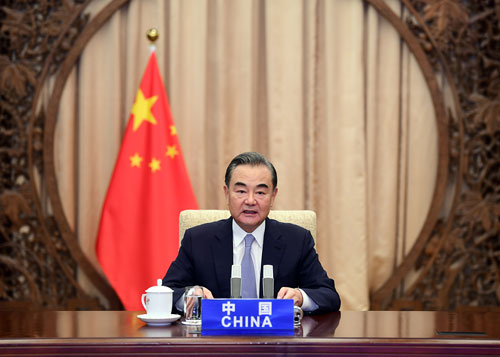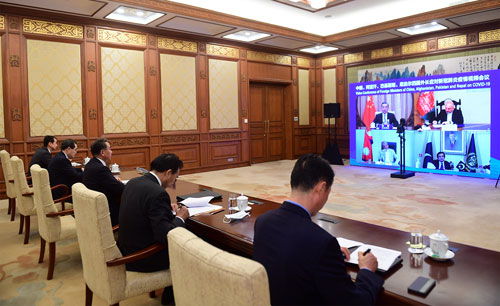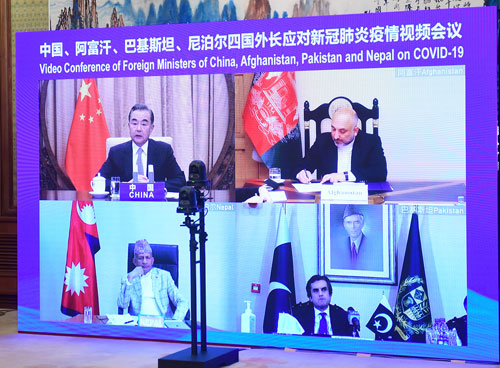State Councilor and Foreign Minister Wang Yi chairs quadrilateral video conference on COVID-19

On 27 July, Foreign Ministers of China, Afghanistan, Pakistan and Nepal held a video conference on COVID-19. The meeting was chaired by State Councilor and Foreign Minister Wang Yi of China, and attended by Acting Foreign Minister Mohammad Haneef Atmar of Afghanistan, Foreign Minister Shah Mehmood Qureshi and Federal Minister for Economic Affairs Makhdum Khusro Bakhtyar of Pakistan, and Foreign Minister Pradeep Kumar Gyawali of Nepal.
Wang Yi noted that the four countries, connected by mountains and rivers, share a common future with closely entwined interests. Since the start of COVID-19, the four countries made all-out efforts to fight the virus and protect people's life and health at home. At the same time, they have lent each other material and moral support in the spirit of solidarity and partnership. Such collective efforts speak volumes about the deep friendship between friendly neighbors.
Wang stressed that China, as a neighbor and partner, will continue to stand shoulder to shoulder with all three countries in these trying times, work together to protect people's health, reopen the economy and secure people's livelihood in a joint effort to prevail over the disease.

Wang made a four-point proposal to strengthen cooperation among the four countries:
First, strengthen the consensus on collective response to the virus. The four countries need to step up communication and coordination and build synergy. They will continue to wish each other well and cherish amicable relations. While maintaining stability in bilateral ties and tranquility in the wider region, the four countries need to focus more energy on saving lives and sustaining livelihood, a pressing task facing all of them.
Some countries have resorted to politicization and stigmatization of the virus, and gone to great lengths to distort facts and upend cooperation in pursuit of selfish political gains. It's a moral stain that will go down in history. Countries need to uphold a rational and science-based attitude, jointly oppose all discriminatory comments and actions, safeguard and carry forward fundamental international principles. They need to firmly support WHO's mandate, and work together for a global community of health for all.
Second, carry out regional cooperation on joint response. The practice of China-Pakistan joint response mechanism may be extended to all four countries and proper arrangements made on containment, economic reopening and personnel exchange. With strict protocols in place, fast-track lanes and green lanes should be opened as soon as possible for flows of people and goods. On land ports, joint response must be strengthened, widely-accepted standard operating procedures formulated and quadrilateral cooperation enhanced on situation updates, outbreak control and emergency response.
Third, step up cooperation on COVID-19 containment and vaccines. China will continue to support all three countries in fighting COVID-19, provide needed supplies, and host a quadrilateral experts' webinar in the near future to share containment experience, diagnostics and therapeutics that are proven effective. Vaccine development and deployment in China, once available, will be made a global public good. This will make the vaccine more accessible in the three countries, and help strengthen their public health systems.
Fourth, promote post-COVID economic recovery and development. The four countries should firmly advance Belt and Road cooperation, work for the early resumption of key cooperation projects, keep the industrial and supply chains stable, and create new growth areas in the digital domain. China calls for advancing the China-Pakistan Economic Corridor and the Trans-Himalayan Connectivity Network, and supports the extension of CPEC to Afghanistan so as to further unleash the dividends of regional connectivity. The four countries should utilize their geographical advantages to strengthen interactions and connectivity with Central Asian countries, and to safeguard regional peace and stability.
Ministers of Afghanistan, Pakistan and Nepal supported Wang Yi's four-point cooperation initiative, and thanked China for providing medical and food assistance, and for sharing experience on COVID-19 containment. In particularly, the ministers highly commended President Xi Jinping's initiative to make the vaccine a global public good.
The three countries will work with China in solidarity to deepen cooperation against COVID-19, strengthen joint response mechanisms, ensure unimpeded trade and transportation routes, facilitate personnel and trade flows, advance the "Silk Road of health", and build a community with a shared future for mankind.
The three countries will work with China to deepen Belt and Road cooperation, accelerate recovery in socio-economic and livelihood development, and promote post-COVID economic growth.
All parties expressed support for upholding multilateralism and strengthening the role of WHO, for realizing a humanitarian ceasefire in Afghanistan during the epidemic, and for the peace and reconciliation process in the country.


Follow us on WeChat
京ICP备18041594号-1
京公网安备 11010202005508号

Follow us on WeChat


